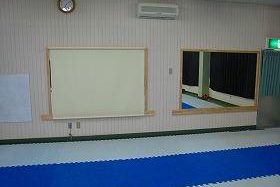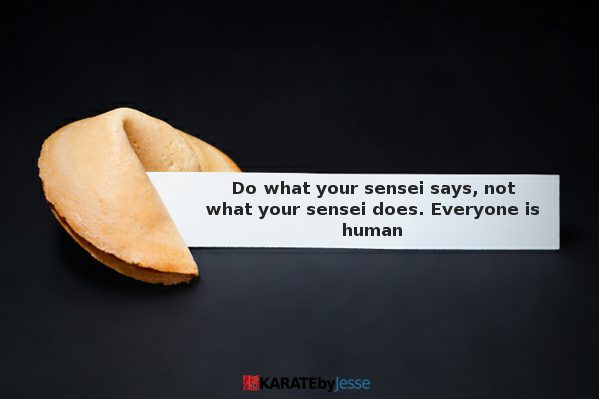Self-defense is not a sport.
I think we can all agree on that.
So, by definition, traditional Karate can’t really be called a sport. Sure, people try hard to make Karate into a pseudo team sport – especially in tournaments – but the harsh reality is that on the mythical ‘streets’ there is just one person you can count on, and that person is you. No backup, no judges, no weight-classes, no safety net. Just you and your bare fists.
However, just like in sports, traditional Karate involves two opposite sides.
A losing side and a winning side.
Which side do you want to be on?
Me, personally, I prefer the winning side. You know, the side that can go home without the crutches. And who doesn’t? I mean, even in school, from a young age, we’re all taught that we should always strive to be winners. Winners get all the praise, attention and honor. Nobody ever comes up to a loser and says “That was great, you’re super!” unless they’re being sarcastic. Right?
Sadly, when it comes to sport, not everybody can always be a winner. If you are smaller, weaker or slower than your competition, chances are slim that you’ll ever win in any significant way (unless you have insane amounts of motivation). You just don’t have the odds on your side. So you change, and either choose a team sport (where you can blend in) or you quit sports altogether and play video games instead.
But, again, traditional Karate isn’t a sport.
Because the streets don’t allow for that.
In self-defense there is no quitting, no changing, and we must always assume that our competition will be bigger, stronger, faster, meaner and harder. Every time.
And, to top it off, we must win.
Every time.
Being average, blending in, is easy and safe in the dojo – but when things are about to go down you need to step your game up and give 110%.
And, if you ask me, one of the most surefire ways to succeed with that is by having the correct mental attitude. So that’s what this article is going to be about. Mental training. Sports psychology. To help you understand a bit more about the non-physical aspect of training… in order to stop being the ‘best of the worst’ or the ‘worst of the best’ (what we generally refer to as being “average”) and have a fighting chance.
Because, although being average, insecure and/or comfy is a common tactic among many dojo rats that I know, those traits won’t exactly help you on the notorious ‘streets’.
You need something more.
I think that ‘something more’ is mental power.
More specifically, control over something known as your ‘self-image’.
Self.
Image.
Taste the words.
If you ask me, the perception of one’s self-image is what mainly appears to separate the top winners from losers. Not nationality, size, color of belt or economic situation. Not some mystical ‘talent’. The seeds of winning, or surviving (in the case of self-defense) lies within all of us – some just have a hard time tapping into it, since our self-image is not perfectly aligned for success.
I want to help you change that.
Listen:
Self-image and performance are always equal. To change your performance, you must first change your self-image.
- Ever noticed how world-class athletes appear very confident, sometimes even almost “cocky”? That’s because their self-image tells them they are superior. They are #1. Because they choose to be.
- Ever noticed how people in Karate class sometimes tell themselves “I’m so bad at this”, “I can’t do this”, or “I will never learn this”? That’s because their self-image tells them they are inferior. They are zeros. Because they choose to be.
Your self-image is what makes you ‘you’.
The self-image, made up of your habits and attitudes, makes you “act like you” and quite simply directs your general behavior. This means that every person has a special way of behaving, directly related to their decided self-image. Some people like to get up early in the morning. Some people like to get up late. Some people think they are good at math. Some people are terrified at speaking before a group. Some people hope they can win.
Some people expect to win.
(Note: we call these people “winners”)
We all have a self-image, and a related behavior that goes with it, shaped by ourself. The sad thing is that most people believe there is nothing they can do about this. They truly believe they are the way they are and cannot change their self-image.
Which, of course, is simply not true.
We can change.
In fact, we are changing every day, all the time, without knowing. We experience change naturally as we age. The direction of that change, however, can either be determined by you or for you.
- In sports, winners are the ones who successfully control and direct their self-image.
- On the street, survivors are the ones who successfully control and direct their self-image
Notice some similarities? That’s why sports psychology is super important.
Example: Some people think it’s not “like them” to drive a car one hundred miles an hour. If they get just a few miles over the speed limit, their self-image makes them feel uncomfortable until they slow down. It’s not “like them” to drive fast, so they don’t. Another example: Some people think it’s not “like them” to be successful at certain stuff, like, say, cooking. So they just eat instant noodles all day long! If they happen to eat something more fancy, they feel uncomfortable.
Some people think it’s not “like them” to be good at Karate.
So they keep sucking…
…in order to ensure their self-image stays true.
We all have a comfort zone, the upper and lower limits being defined by our self-image. It is “like us” to operate within this zone. And as long as we are in the zone, our self-image is content to leave us alone. If, however, we start scoring lower than our limit, our self-image will provide us with extra power to improve until we are back in the zone. That’s great. Corollary, if we start scoring better than our comfort zone, our self-image slows us down until we are, again, comfortable and average. That sucks.
So what we need to do is push that upper limit of our comfort zone, bringing our self-image to another level.
Changing your self-image changes your performance.
The secret lies in realizing that you can replace the self-image you have with the self-image you want.
Any day.
So how do you do that? Well, improving your self-image, like improving any skill (yes, it’s a mental skill, not unlike a physical skill), takes time and practice. But, there’s a couple of tricks. Developing a positive self-image involves encouraging a positive (but realistic) attitude toward yourself and the world around you and appreciating your worth, while at the same time behaving responsibly towards others (a problem some top athletes seem to have).
Just remember: having a great self-image isn’t about self-absorption – it’s about self-respect.
And last time I checked, Karate was all about respect.
By working from the inside out (focusing on changing your own way of thinking before changing the circumstances around you), you can improve your self-image. The goal of this “positive thinking” (man, I hate that term) is to give yourself a more positive self-concept, while seeing yourself honestly and accepting yourself, and removing the internal barriers that can keep you from doing your best.
So here’s a couple of “positive thought” strategies that I encourage you to try out. Perhaps you could write them down and remind yourself to pause and change your way of thinking each time you are being critical of yourself? Try just one or two, and as you become more comfortable with each new way of thinking (for example, learning not to apologize or accept blame for other’s anger) try adding a new positive thought strategy to your list.
Look:
- Avoid exaggerations: Correct your internal voice when it exaggerates, especially when it exaggerates the negative. Try to avoid thinking in extreme terms (“I always make that mistake” or “I’ll never get that promotion”).
- Nip negative thoughts in the bud: Sometimes putting a stop on negative thinking is as easy as that. The next time you start giving yourself an internal browbeating, tell yourself to “stop it!”. If you saw a person yelling insults at another person, you would probably tell them to stop, right? Why do you accept that behavior from yourself?
- Accentuate the positive: Instead of focusing on what you think are your negative qualities, accentuate your strengths and assets. Maybe you didn’t ace the test you were studying for, but maybe your hard work and perseverance led to a better grade than you would have had? Or maybe you improved your work ethic? Maybe you felt nervous and self-conscious when giving a presentation at work, but maybe your boss and coworkers respected you for getting up and trying? Accentuate the positive stuff.
- Accept flaws and being human: Maybe you did get nervous and blew that presentation at work – so what? Talk to your boss about what went wrong, try to address the error in the future, and move on. All people have flaws and make mistakes. Your boss, coworkers, friends, family, postman, congressman, sensei and favorite movie star have all made mistakes. They’ve forgiven themselves; so can you.
- Accept imperfections: Perfection is a high goal to aim for – but you don’t need to start there or even end there. Make doing your best your ideal (I mean, what more can you realistically do?). Focus on what you’ve gained from the process and how you can use it in the future. Avoid focusing on what wasn’t done or ‘should have’ been done differently. Allow yourself to make mistakes and then forgive yourself. Try laughing instead of criticizing.
- Don’t bully yourself: “Should have, could have, would have… “, try not to constantly second guess yourself, criticize yourself for what you “should” have done better, or expect too much from yourself. Don’t put standards on yourself that you wouldn’t expect from others. It’s great to want to do well, but expecting yourself to be perfect (which is impossible) and then punishing yourself when you fail is a vicious cycle. Using expressions like “I should have” is just a way of punishing yourself after the fact. Besides, it sounds stupid.
- Replace criticism with encouragement: Instead of nagging or focusing on the negative (in yourself and others), replace your criticism with encouragement. Give constructive criticism instead of being critical (use “Maybe if I tried to do ____ next time, it would be even better” instead of “I didn’t do that right.”) Compliment yourself and those around you on what you have achieved (“Well, we may not have done it all, but we did a pretty great job with what we did!”).
- Don’t feel guilty about things beyond your control: You are not to blame every time something goes wrong or someone has a problem. Apologizing for things and accepting blame can be a positive quality, if you are in the wrong and if you learn and move on. But you shouldn’t feel responsible for all problems or assume you are to blame whenever someone is upset.
- Don’t feel responsible for everything: Just as everything is not your fault, not everything is your responsibility. It’s okay to be helpful, but don’t feel the need to be all things (and do all things) for all people. This is taking too much of a burden on yourself while limiting those around you. Let others be responsible for themselves and their actions – you shouldn’t feel responsible for their happiness or success.
- DO feel responsible for your feelings: Just as you can’t “make” other people happy, don’t expect others to “make” you feel happy or good about yourself. In the same way, they shouldn’t make you feel guilty or bad about yourself. You create your own feelings and make your own decisions. People and events may have an affect on your emotions, but they can never dictate them. You do.
- Treat yourself kindly: People often feel more comfortable treating themselves in ways they wouldn’t consider treating others. Do you criticize yourself with terms like “stupid”, “ugly” or “loser”? Would you use those terms to describe a friend? Remind yourself that you deserve to be treated as well as you treat others. Do something nice for yourself sometimes – either in thought (give yourself a compliment) or action (treat yourself to a nice dinner or new book.). Sure, my own personal motto might be “be kind to others but hard on yourself”, but I’m pretty weird. You don’t have to be.
- Give yourself a break: You don’t need to be all things to all people or please everyone. Give yourself permission to decide you’re doing the best you can. Remind yourself when you’re doing things well – don’t wait to hear it from someone else.
- Choose the brighter side of things: You can choose how to interpret comments and events, so try for the more positive interpretations. If someone says, “You look good today!” never ask yourself “What was wrong with the way I looked yesterday?”. Accept compliments graciously. Look at temporary setbacks as opportunities for growth. Especially when your sensei gives you feedback.
- Forgive and forget: Try not to hang on to painful memories and bad feelings – this is a surefire way to encourage negative thoughts and bad moods. Your past can control you if you don’t control it. If you can, forgive past wrongs and move on. (Don’t forget that forgiving yourself is an important part of this process, too!). You can’t let the past determine your future. I know, I know… harder than it sounds.
- Focus on what you CAN do, not what you can’t: Avoid “can’t” thinking or other negative language. If you say something often enough, you may start to believe it, so keep your statements positive, not negative. Don’t be afraid to seek help in accomplishing things, but remind yourself that you don’t need approval from others to recognize your accomplishments. Focus on what you’re able to do. If you’re a sensei, never show students the “wrong” way of doing a technique. It helps nobody.
Phew… that was an exhaustive list.
Using just one or two of the above strategies on a regular basis can greatly increase your positive self-image (and self-esteem) for becoming better at your mental skills. Making these internal changes can increase your confidence in yourself and your willingness and ability to make external changes and hopefully improve not only your Karate, but your life.
Which, at the end of the day, is what Karate should be all about.
Improving the quality of your life.
So give it a try.
Self-image and performance are always equal. To change your performance, you must first change your self-image.



9 Comments